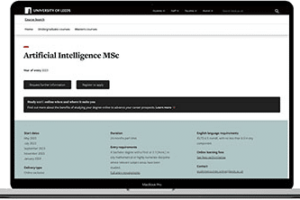5 Ways AI is Changing Business

Artificial Intelligence (AI) is changing the way businesses understand both internal and external processes across a multitude of sectors, from Healthcare to Transport and Banking to Engineering. AI is already transforming businesses across the world, regardless of size and scope, including helping create opportunities for developing nations to grow. Gaining knowledge of how AI works is crucial for professionals across sectors, no matter where they work.
Learning about how AI is changing business, and how you can capitalise upon these changes, is the first step to influencing AI strategy within your organisation and being at the forefront of the future. This blog discusses five ways that AI is changing business, and how you might react to capitalise upon this change.

1. Understanding big data
Exploiting big data for business can be used to develop better business strategies, explore new markets, reach customers, promote products, optimise workflows, and lower costs. Regardless of sector, big data can help increase profitability through data collection, processing, and analysis.
Businesses today collect an abundance of data on consumers from channels such as cookies, social media, and customer surveys, all of which give insight into user behaviour. However, rather than analysing these channels alone, big data looks at finding patterns across data sets to employ for many purposes.
Some companies, such as Amazon, take this a step further and create predictive analytics based on large data sets. The larger the volume of data, the more precise and relatable to real life the results are, provided the algorithms in place are correct. This allows a business to forecast what they think a customer might want before the customer informs the business of this need or desire. For example, when Amazon automatically recommends products purchased by other customers with profiles like yours.
This big data allows businesses to provide very personalised services to customers, improving the overall experience.

2. Increasing personalisation
AI is allowing businesses, especially marketers, to personalise products, services and offers to consumers. 63% of whom expect personalisation and believe they are recognised as individuals when sent exclusive offers (Accenture). AI systems such as Google Home and Amazon Alexa allow customers to request products and services through voice alone. Because customers are time-poor and more accustomed to technology, businesses are competing for more than their products alone, striving for the best customer personalisation and experience.
Through analysing data and creating algorithms to identify and understand consumer behaviour, marketers can tailor their campaigns to specific customers. This allows these offers to be made and products and services to be customised for consumer needs. Understanding how to analyse the data drawn from algorithms and using it to form marketing campaigns to improve customer experiences is a crucial element of modern business. Learning these skills to apply to your business can help you address work-related challenges.

3. Increasing automation
AI and automation are changing the way businesses operate and will continue to contribute to increased growth and productivity. The concept of automation scares a lot of people. Why? The automation of manufacturing, transportation, and maintenance tasks has eliminated many jobs, and certain jobs will become extinct at the hands of intelligent robots. Yes, machines will be able to carry out more of the tasks done by humans, complement the work that humans do, and even perform some tasks that go beyond what humans can do. As a result, some jobs will decline, others will grow, and many more will change (McKinsey).
It’s important to note that the AI revolution has been responsible for the creation of many jobs such as controlling and programming the AI systems. Upskilling into roles that complement AI systems will continue to aid productivity and growth in organisations, helping you to face the future of the sector you wish to pursue.

4. Reducing costs
Many people automatically assume that modern technologies are expensive, making affordability a key driving factor in its creation. As AI becomes more effective, reliable, and utilised by the masses, it also becomes more affordable for businesses to implement. Due to the limitations of a human workforce, such as time and resources, AI is often the most cost-effective option. For example, a customer service chatbot can answer most common questions, and hand over more complex questions to a human expert.
This, coupled with the ability to increase productivity and reduce the mundane, repetitive tasks, makes it an attractive prospect for businesses to implement. You could use your knowledge of AI to influence company strategy and impress employers, helping them evaluate the risks and opportunities associated with innovative technologies and market approaches.

5. Improving cybersecurity
Unfortunately, due to the magnitude of potential cybersecurity threats, it is not a human-scale problem anymore. In response to this, AI tools are helping to reduce the risk of breaches and improve a company’s security posture effectively.
Whilst it can seem unnatural to rely on computer programmes to improve the security of computers, many cybersecurity breaches across organisations are due to human error. AI can filter out potentially malicious links, spam or phishing emails before employees open them, minimising this risk. These technologies also learn over time, drawing from the past data to identify new types of attacks.
Adding value to business
AI technologies are generating value across products and services in a wide range of sectors and businesses alike. Companies are using AI to personalise product recommendations, find production anomalies, personalise marketing campaigns, automate processes, identify fraud and cybersecurity breaches, and simultaneously save on cost.
And it does not stop there. There are new generations of AI being developed to further aid business processes and systems, making the future even more exciting for those upskilling in this area.
How can you upskill in AI?
If you recognise the importance of AI for the future of your industry, our online Artificial Intelligence MSc gives you the forward-thinking knowledge to take your career to the next level. This course is for professionals from a range of careers, including professor, senior manager, CEO (Chief Executive Officer) or sales and marketing roles.
Specialist modules like Robotics, Deep Learning, Data Mining and Text Analytics, and Machine Learning have been aligned with market needs to help you learn high-demand skills. There has never been a more crucial time for businesses to have knowledge about the future of AI, and our specialised curriculum brings a modern, technology-focused perspective to help you address work-related challenges.
Did you enjoy this blog? Here is some related artificial intelligence content that you may be interested in:
Want to learn more about our online Artificial Intelligence course?

Check out the course content and how to apply.

